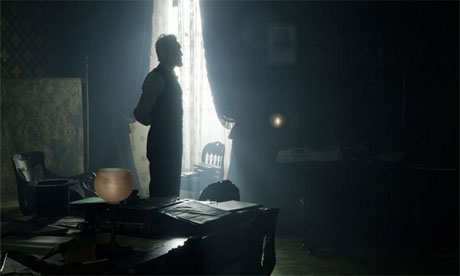
Lincoln (2012)
Director: Steven Spielberg
Entertainment grade: B+
History grade: B+
Abraham Lincoln was the 16th president of the United States. He is remembered for winning the country's civil war and ending slavery, both in 1865.
Politics
The film opens towards the end of the war, with the slaveholding Confederate south staggering towards defeat. Abraham Lincoln (Daniel Day-Lewis), nearing victory, visits his Union troops. There is little fighting on screen. Most of the action is talky, and takes place in and around the White House and in the House of Representatives. If you liked The West Wing, this may well be up your street: think of Lincoln as the prequel. On the other hand, if your tolerance for the intricacies of American legislative procedure is low, this could be a heavygoing two and a half hours. There isn't even the teeniest hint of vampire hunting. What an oversight.
Bargaining
The president needs to secure enough votes in Congress to pass the 13th amendment to the constitution, which would end slavery. This isn't easy. Many congressmen care more about peace or victory than what happens to slaves. Some are only happy to end slavery if equality goes no further: the idea of giving black men the vote, for example, seems to them nearly as absurd as giving it to women. Several will sell their vote for a comfortable job. Only a very few radicals emerge as decent human beings, calling for the end of slavery on grounds that it is wrong – and they have to be hushed up in case they scare everyone else into a racist stampede. International audiences who may not be familiar with American history are in for a shock: in 1865, the Republicans were the good guys.
People
Enter Thaddeus Stevens (Tommy Lee Jones), a Republican radical from Pennsylvania with fire in his belly and all the best lines. He wears a conspicuous wig and a hangdog expression, and if you look up pictures of the real Thaddeus Stevens you will see that both are precisely historically accurate. "This is the face of someone who has fought long and hard for the good of the people without caring much for any of them," he growls. "And I look a lot worse without the wig." Meanwhile, there's a touch of The West Wing's President Bartlet to Day-Lewis's Lincoln: he hides a searing intellect under all that folksy charm, and even the occasional flash of a human flaw doesn't really undermine his saintliness. Some of the film's best scenes focus on those human flaws, notably in his relationship with his wife, the clever but desperately unhappy Mary Todd Lincoln (Sally Field).
Freedom
Historian Eric Foner, whose work on Lincoln and slavery has been highly acclaimed, has argued that the film exaggerates the importance of the January 1865 debate on the 13th amendment, and that it gives Lincoln too much personal credit. It comprehensively ignores the roles of black and women activists. Reportedly, Spielberg first conceived the film around Lincoln's friendship with black abolitionist Frederick Douglass, who – very regrettably – isn't in the finished version at all. Furthermore, the 13th amendment was the result of a 400,000-signature anti-slavery petition organised by the Women's National Loyal League, headed by Susan B Anthony and Elizabeth Cady Stanton. They aren't in the film either.
Reputations
From a historian's point of view, the transformation in Hollywood's attitude to Thaddeus Stevens over the last century is striking. Back in 1915, he was ridiculed as the villainous race-traitor Austin Stoneman in DW Griffith's paean to the Ku Klux Klan, Birth of a Nation. In 2013, he is revered in Spielberg's Lincoln as a great liberator and a man far ahead of his time. It is he, even more than the 16th president, who emerges as this film's hero.
Verdict
Lincoln is a strikingly well-made film, with fine performances, an intelligent screenplay, and mature, restrained direction from Spielberg. If you want the full story of how slavery was ended, though, this isn't it.

